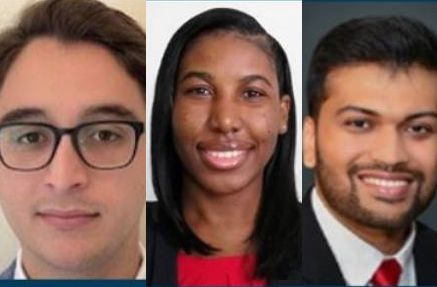
July marked the official start of residency training for thousands of physicians who were matched into programs across the. United States, including 106 physicians who began their journey as residents at the George Washington University (GW) School of Medicine and Health Sciences (SMHS). This includes three physicians who participated in GW’s Medical Research Fellowship Program and who were among the approximately 60% of non-U.S. or U.S. international medical graduates (IMGs) to match into U.S. residency programs in 2022 based on data from the National Resident Matching Program (NRMP).
The Medical Research Fellowship Program (MRFP) is managed through GW’s Office of International Medicine Programs (IMP) and was explicitly designed for IMGs preparing to apply for U.S. graduate medical education. The program offers a unique, structured curriculum involving research, clinical observation, mentorship, and professional development. Research fellows contribute to impactful research with the opportunity to publish in leading medical journals and participate in weekly clinical observation, which offers firsthand experience in the U.S. medical system. Research fellows are mentored along the way by a GW faculty member in their specialty of interest who closely advises on their progress and development.
Research fellows also receive extensive guidance and support in navigating the residency application process, which begins in September. IMGs apply through the same process as U.S. medical students and graduates by submitting applications through the Electronic Residency Matching System (ERAS). This system allows individual programs to evaluate the qualifications of applicants based on several criteria. There are additional requirements IMGs must adhere to, which include applying for certification by the Educational Commission for Foreign Medical Graduates (ECFMG) through one of six different pathways.
Since MRFP's first cohort in 2012, a total of 88% of research fellows have successfully matched into residency programs across the U.S. This includes three recent alums who were accepted into GW's residency program for Internal Medicine this year. Dania Taylor, MBBS, from Jamaica, and Ivan Berezowski, MD, from the Dominican Republic, participated in MRFP in 2021, as well as Jigar Patel, MBBS, from India, who was a research fellow in 2020–21.
Since the path to U.S. residency as an IMG can be incredibly challenging, it is even more critical for these medical graduates to consider ways to make their application more competitive and stand out amongst the thousands of other physicians applying. With this in mind, Berezowski decided to apply for MRFP after speaking to a program alum whohad gone on to match at GW for residency and fellowship and shared his positive experiences as a research fellow at GW.
Berezowski was supported by his faculty mentor, Juan Reyes, MD, assistant professor of medicine, along with MRFP Medical Director Ali Pourmand, MD, MPH, professor of emergency medicine. As a result of participating in MRFP, Berezowski received 10 publications in journals that include The Lancet, Resuscitation, and the American Journal of Emergency Medicine. In reflecting on his experiences, Berezowski expressed that joining MRFP was the “best decision I have made for my career and path into residency in the U.S.”
Taylor was also thrilled to learn she would be joining GW as a resident this past July. As a research fellow, Taylor also published in leading medical journals and presented a poster at the Society of General Internal Medicine. In addition to research, she focused on enhancing her clinical skills with her faculty mentor, Brad Moore, MD, MPH, associate professor of medicine, health policy, and health services management and leadership, and director of the lifestyle medicine program.
IMGs who applied for residency this year encountered new changes. One of which was the United States Medical Licensing Exam (USMLE) Step 1 moving to a Pass/Fail score, which was recently implemented by the USMLE Federation of State Medical Boards (FSMB) and the National Board of Medical Examiners (NBME) in January 2022. While this change was intended to reduce stress levels and encourage program directors to review applications more holistically, many expect that other areas, such as publications, recommendation letters, and U.S. clinical experience, will hold greater weight. As a result, programs such as MRFP are becoming even more valuable for IMGs seeking U.S. residency positions.
After reflecting upon her years of persistent hard work and unwavering dedication required to become a physician, Taylor strongly encourages IMGs to be proactive if they intend to apply for U.S. residency.“If you want to obtain great letters of recommendation from preceptors, then be proactive, take the initiative, and show them that you are an excellent residency applicant who deserves their support because that's exactly who you are.”
Berezowski also extended his advice on the process. “My main advice would be not to be overwhelmed by the difficulty and complexities of the process — continue to work hard, show initiative, and participate in as many U.S.-based clinical and research opportunities as possible. You will be surprised by how much you can accomplish and how far you can make it.”
IMP is now accepting applications for candidates interested in participating in the Medical Research Fellowship Program beginning May 2023. Eligibility and application requirements can be found on IMP's website.